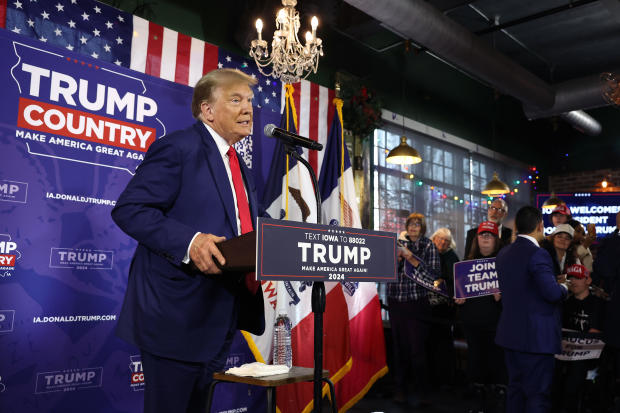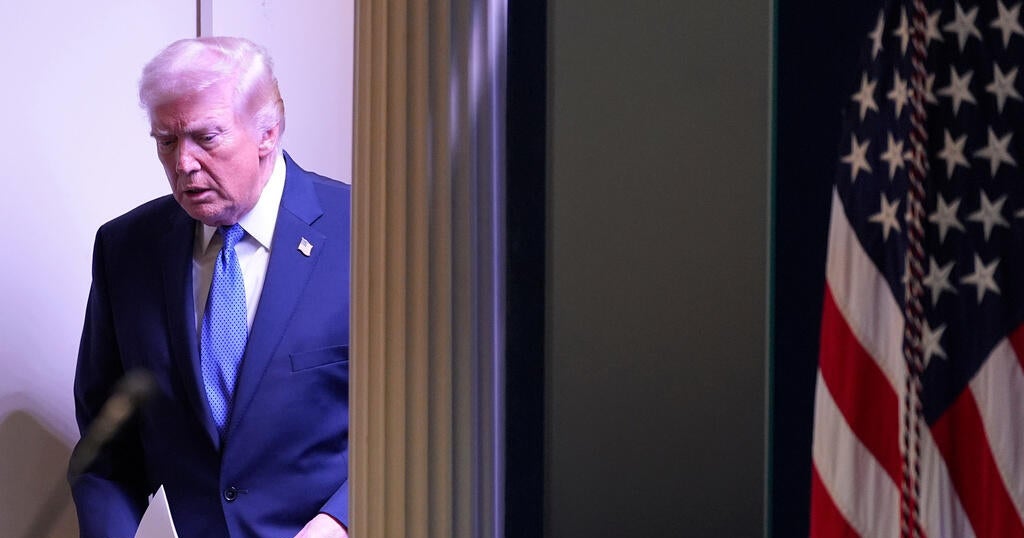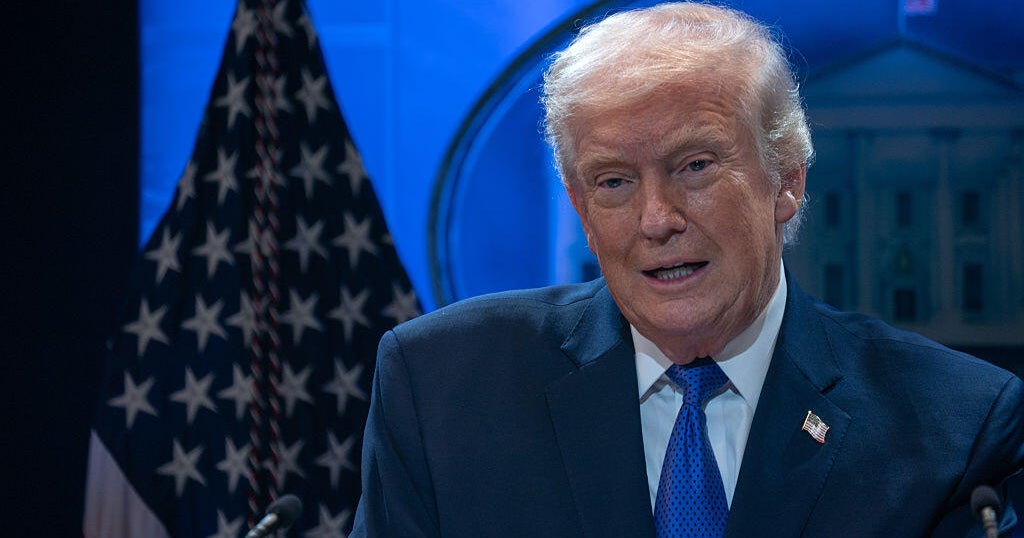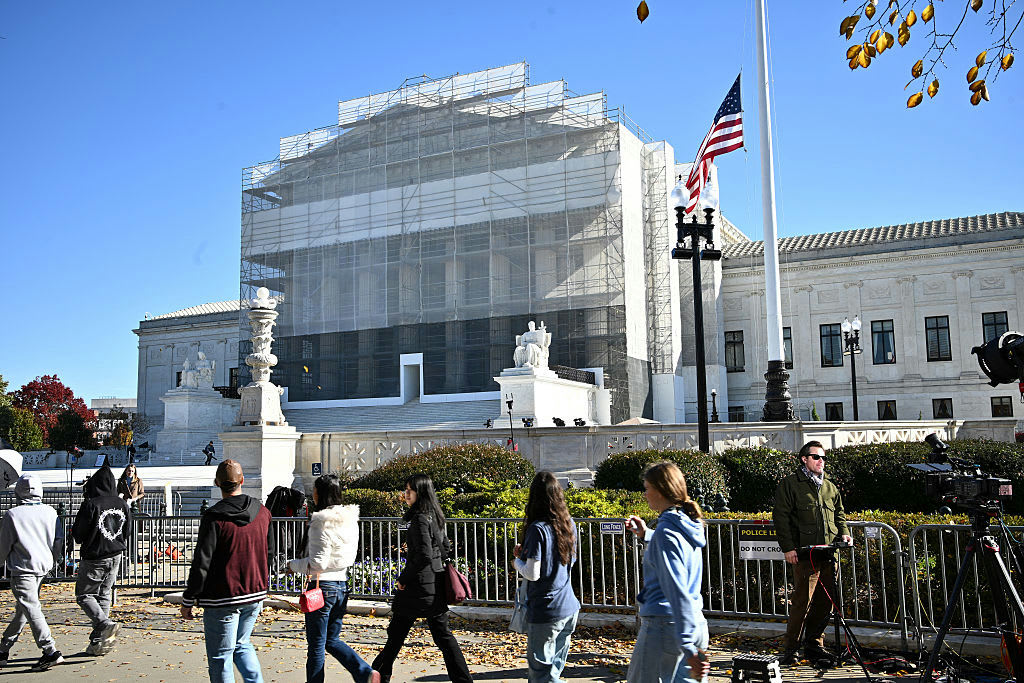Colorado Supreme Court weighs 14th Amendment challenge to Trump's eligibility for GOP primary ballot
Washington — The Colorado Supreme Court on Wednesday weighed whether former President Donald Trump should be kept off the state's ballot under a rarely invoked provision of the 14th Amendment in a closely watched legal fight that is likely to land before the U.S. Supreme Court.
The challenge to Trump's candidacy in Colorado is just one in a nationwide fight underway in courts across more than a dozen states. Those arguing against Trump say he is disqualified from holding federal office again under Section 3 of the 14th Amendment because of his conduct surrounding the Jan. 6, 2021, attack on the U.S. Capitol.
The provision says those who engaged in insurrection against the Constitution after swearing an oath to support it cannot hold federal or state office. While enacted after the Civil War and designed to exclude former Confederate civil and military officials from future office, the so-called disqualification clause has now been invoked to target Trump's candidacy.
During two hours of arguments, the seven members of Colorado's high court raised an array of questions ranging from the procedural — whether the court has jurisdiction to decide the case at all and if the secretary of state has the authority to keep someone off the ballot under state law — to the weighty — whether Jan. 6 was indeed an insurrection, and if it was one that Trump engaged in, and whether Section 3 covers the former president and the presidency.
"The secretary's duties under the provisions that govern presidential primaries very clearly are limited to making sure that a presidential primary candidate is a bona fide candidate under party rules and has timely submitted a certificate of intent … that's it," Justice Monica Márquez told Eric Olson, who argued on behalf of the Colorado voters.
Several of the justices expressed concern that a decision finding that Trump is disqualified from holding office under Section 3 and ordering him to be left off the ballot could harm Republican and unaffiliated voters in Colorado.
"If what you're saying is correct, President Trump will be on the ballot in most states, but not here in Colorado, so effectively, the Republican or unaffiliated voter who wants to participate in the presidential Republican primary won't really be able to participate, because the person who's on most ballots and appears to be leading in the primary is not an option," Justice Melissa Hart told Olson.
The question of Trump's eligibility is widely expected to land before the U.S. Supreme Court, a likelihood acknowledged by one member of Colorado's high court amid concerns that differing interpretations of Section 3 by the states would lead to "chaos."
"If we were to say that President Trump can't be on the ballot here, there's a very high probability that the United States Supreme Court would step in and decide what the standard should be, one would think, so there wouldn't be the same potential for the chaos," Justice William Hood said.
Still, Olson said a decision on Trump's eligibility will ensure that the Colorado presidential primary ballot reflects candidates who are qualified for office.
"Our clients, who are Republicans and Independents, they filed this suit because they want a fair shot in the Republican primary to vote for a qualified candidate and have their support for a qualified candidate not be diluted through a vote for a candidate who will subsequently be disqualified," he said.
Colorado Secretary of State Jena Griswold has until Jan. 5 to certify the candidates for the state's March 5 primary, and polls show Trump is leading the field of candidates vying for the Republican presidential nomination.
The Colorado lawsuit
The dispute before the state supreme court was brought by Citizens for Responsibility and Ethics in Washington on behalf of four Republican and two unaffiliated voters. The group filed its lawsuit against Griswold and Trump in September and argued the former president is disqualified from public office under Section 3. The voters asked a state trial court in Denver to block Griswold from taking any action that would allow Trump access to the ballot.
Following a five-day hearing, Judge Sarah Wallace concluded that the Jan. 6 assault was an insurrection against the Constitution, and found that Trump engaged in insurrection — the first time a court has made such a finding about the former president's conduct regarding Jan. 6. But despite that, the judge found that Trump was not disqualified under Section 3 because the clause does not apply to those who took only the presidential oath and does not prevent those who engaged in insurrection from becoming president.
Section 3 of the 14th Amendment states:
No person shall be a Senator or Representative in Congress, or elector of President and Vice-President, or hold any office, civil or military, under the United States, or under any State, who, having previously taken an oath, as a member of Congress, or as an officer of the United States, or as a member of any State legislature, or as an executive or judicial officer of any State, to support the Constitution of the United States, shall have engaged in insurrection or rebellion against the same, or given aid or comfort to the enemies thereof. But Congress may by a vote of two-thirds of each House, remove such disability.
Wallace's ruling rested on her finding that the president is not an "officer of the United States," as cited in Section 3. She said the president's oath to "preserve, protect, and defend the Constitution" differs from an oath to "support" the Constitution, as specified in the provision. As a result, she ordered Griswold to place Trump on the state's GOP presidential primary ballot.
Both the group of voters challenging Trump's candidacy and the former president himself appealed to the Colorado Supreme Court. The voters argued that Section 3 covers the president and presidential oath. Trump, meanwhile, pushed back on the findings involving the events of Jan. 6, among other matters.
Jason Murray, who also argued on behalf of the Colorado voters, told the justices those who took an oath to support the Constitution and betrayed that duty by engaging in insurrection cannot be trusted to hold public office again.
He argued the drafters of the 14th Amendment took a "kitchen sink approach" when writing Section 3 to encompass the president and vice president, even though neither are specifically listed in the provision.
Murray also argued that the phrase "support the Constitution" was a broad concept meant to cover the oaths taken by all federal officials, including the president.
Some of the justices, though, questioned why the drafters would exclude the president and vice president from the disqualification clause given that other office-holders, such as senators and representatives, are explicitly listed.
"If it was so important that the president be included, I come back to the question, why not spell it out?" Justice Carlos Samour asked.
Others later suggested it is difficult to understand how the presidency is not covered by Section 3.
"How is it not absurd to say anybody who engaged in insurrection can't serve in office except the president, or former president, or a vice president?" Justice Richard Gabriel asked Scott Gessler, who argued on behalf of Trump, referencing the so-called absurdity doctrine.
Gessler argued that presidential electors would ensure an insurrectionist did not hold the presidency.
"Do you really think the framers took a whole lot of comfort in the fact that the electors are going to protect us from an insurrectionist former president like a Jefferson Davis?" Gabriel replied.
Márquez echoed that sentiment, telling Gessler she saw "no rational reason" for excluding the presidency.
"It seems to make no sense to me … that if the purpose of Section 3 was to punish oath-breakers, that you would set up a provision that punishes those who break the lesser oath but exempts persons who break the arguably more serious oath to preserve, protect and defend" the Constitution, she said.
The former president challenged several aspects of Wallace's decision and claimed the trial court lacked jurisdiction to consider the case because Section 3 is not self-executing and could only be enforced through an act of Congress.
Gessler asked the Colorado Supreme Court to strike Wallace's suggestions that Trump engaged in insurrection on Jan. 6
The former president's use of the word "fight" in public comments the day of the assault was "perfectly consistent with normal patterns of political discourse," Gessler argued.
During questions focusing on the events of Jan. 6, the justices debated the definition of "insurrection" and whether Jan. 6 would constitute such an event.
"The question, at least as to insurrection, setting apart whether President Trump engaged in insurrection, … why isn't it enough that a violent mob breach the Capitol when Congress was performing a core, constitutional function?" Hood asked. "In some ways, that seems like a poster child for insurrection."
Gessler, though, argued that a broader event spanning more than three hours that includes a wider geographical scope would constitute an insurrection.
"The events of January were more like a riot, and far less than a rebellion, and insurrection is far closer to rebellion than riot," he said, though he acknowledged that the violence at the Capitol on Jan. 6 was "not acceptable."
Other cases
A court has not yet declared Trump ineligible for the presidency under Section 3, though the case brought in Colorado has progressed the quickest.
At least two courts, a state court in Michigan and a federal district court in New Hampshire, dismissed cases seeking to exclude Trump from their states' presidential primary ballots because they raised political questions that courts were barred from adjudicating. A group of Michigan voters has appealed the decision from the court of appeals and asked the state supreme court to step in.
In Minnesota, the state supreme court dismissed a lawsuit that also sought to bar Trump from the primary ballot under Section 3. But the court said in its ruling that voters challenging his candidacy could return after the state's primary election on March 5 and pursue a case over the general election.




